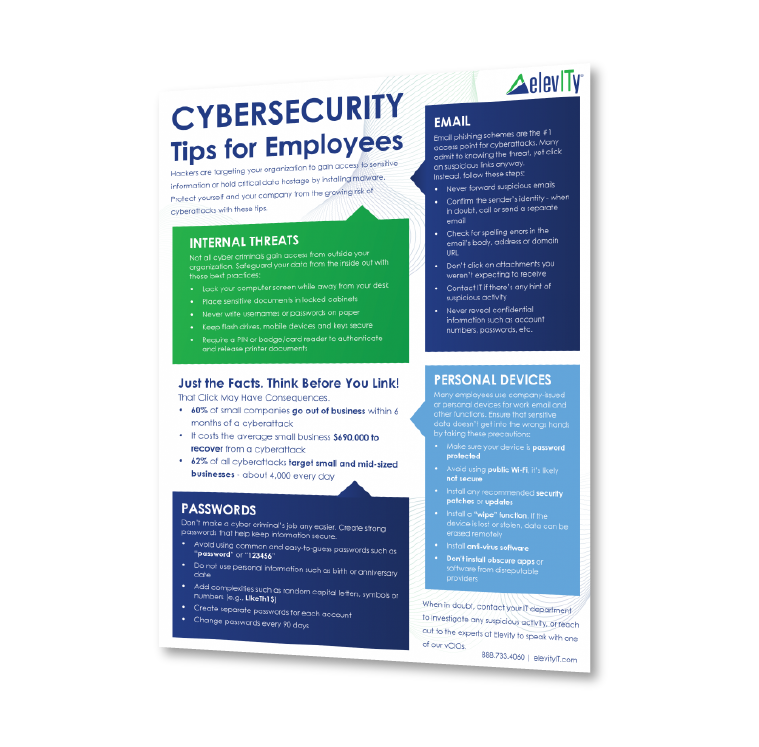Protecting your business technology from obsolescence and cyberthreats is becoming increasingly complicated – and important. The good news is that small and medium-size businesses don’t have to face this challenge alone. If you want to get the right managed technology provider, here are the five most important questions to ask to help you find a provider whose interests are aligned with yours.
1) How To Choose An MSP That Offers Strategic Planning
Before you turn the keys to your company’s technology over to an outsider, they should offer an assessment and roadmap for your partnership. They should identify the key gaps and inefficiencies they can help improve. This will ensure you find a provider that doesn’t just offer reactive services, but a proactive and strategic approach to technology.
This is the key difference between a reactive IT program and technology management. A Managed IT services provider might offer tech support and sell solutions, but cannot offer strategic advice and planning for long-term success.
In today's evolving digital landscape, your managed technology provider should also offer guidance on digital transformation initiatives, such as cloud migration strategies, AI integration, and automation, all of which can help ensure that your business remains competitive.
RELATED: How An IT Strategy for Business Helps You Scale and Grow
2) How Secure Is the MSP?
Unfortunately, hackers target small businesses because they believe those businesses cannot invest in enterprise grade cybersecurity tools. Unfortunately, about 60% of businesses will close their doors within six months of a cyberattack because of the remediation costs, which can be more than a million dollars. This statistic demonstrates the devastating impact that such incidents can have on small enterprises, particularly those that lack robust cybersecurity measures or recovery plans.
Our goal is not to scare people, but we hope they recognize just how much we are all exposed to cyberthreats in our everyday interactions. Be sure to find out if a potential partner offers enterprise-level proactive security solutions and support. Have they investigated next-generation tools to help you stay ahead of the bad guys? For example, newer solutions like MDR – Managed Detection and Respond – actively look for Indications of Compromise (IOC) that might be otherwise missed. Their security offerings should go beyond basic protections and include cutting-edge defenses against emerging threats like ransomware-as-a-service (RaaS).
In addition, does the outsourced IT support vendor have a Security Operations Center (SOC) team to watch for attacks and remediate if something happens to your network? A professional SOC can bring the time to detection in critical moments from days down to minutes.
3) How Reliable Are They?
All technology companies will claim to offer 99.9% uptime, but can they back up their claims? If your business is hit with a disaster or another outage, are they prepared? A good managed technology provider will help you plan for the future, protect your data and make sure your business can recover from a disruptive event with a comprehensive business continuity and disaster recovery (BCDR) plan for both on-premise and cloud-based assets.
RELATED: 7 Steps To Developing an IT Disaster Plan
Also, find out if a potential partner is available 24x7. Do they have engineers who are on-call nights, weekends and holidays? In an emergency, can they help with issues after-hours? Many partners will only respond during office hours.
4) What Are Their Technical Capabilities and Certifications?
Once you understand the strategic capabilities of a partner, it’s time to check their technical expertise, partnerships and additional qualifications that showcase their abilities. This helps you understand their technical side along with their strengths and weaknesses. If they claim to be cybersecurity experts, do they have technical certifications to back that up? If they will be hosting your Microsoft applications, are they a certified Microsoft partner?
5) Can They Train Your Staff?
Email is the primary threat vector for most cyber threats – it often starts with an email trying to get your staff to click a link or divulge information. Even with good training your people need constant re-education. The bad actors target early on Monday mornings or Friday evenings – when they know people are at home and have their guard down. One of the benefits of a managed IT services partner is that they can provide ongoing security training for your users (and in a way that’s most engaging to your users, like video) and can give you an individual risk score of every one of your employees.
When you choose a managed technology partner to assist your business, it frees employees to focus on the organization’s mission. We want to work with organizations who put great value in the technology that powers their teams. If that sounds like you, we’d love to start the conversation to learn more.








%20cropped.jpg)





